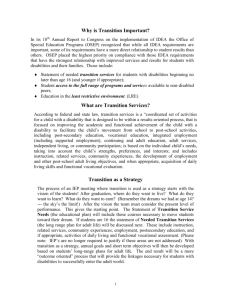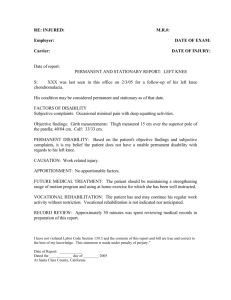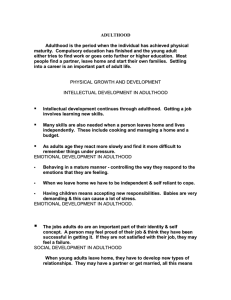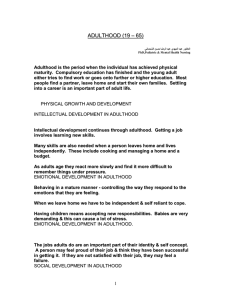Dr.Mumpuniarti, M Pd 1* 1.Special Education Department, Faculty of Education;Yogyakarta State
advertisement
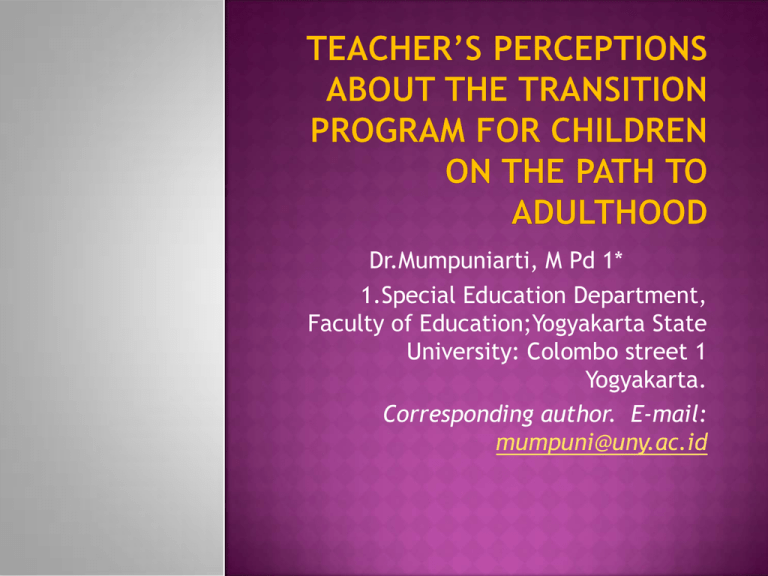
Dr.Mumpuniarti, M Pd 1* 1.Special Education Department, Faculty of Education;Yogyakarta State University: Colombo street 1 Yogyakarta. Corresponding author. E-mail: mumpuni@uny.ac.id 1. 2. 3. 4. intellectual disability refers to an individual who needs life skills in order to be independent The training specification should be in line with the individual’s potential barriers. the individual’s limitation, be it physical or emotional, often leads to a negative perspective from the society. The society is likely to assume the individual as a person who cannot involve totally in the social life. NEXT 5. 6. 7. The problem covers the skills needed by the individual to earn a living for him or herself and the skills required to live well in the midst of society. The research finding implicitly emphasizes on the useful skill for the individual with intellectual disability is to be trained within a natural atmosphere. To that end, intelligence disability also needs to have coaching on self-direction skills so as to support independency, in addition to the skills that made vocational field. NEXT 1. 2. this study is to describe the teacher's perception of the needs of the transition program into adulthood for the children with intellectual disability in Yogyakarta. It also highlights the guidance program needed by the children. 1. Self-determination is a central skill to the disability of intelligence, because the decision in choosing the activities that need to be done everyday lies in this ability. 2. These skills form the ability to decide the activities on the basis of their own accord and as the main actors in the life and enhance the quality of life. 3. To that end, intelligence disability also needs to have coaching on self-direction skills so as to support independency, in addition to the skills that made vocational field. 4. 5. 6. Intellectual disability or mental retardation, is "characterized by significant limitation both in intelectual functioning and in adaptive behavior as expressed in conceptual, social , and practical adaptive skills. Conceptual barriers needed solution to learn about the way of life in the communities directly with the practice of concrete setting social barriers with solutions focused on behavior management according to the manners in society and adaptive communication skills. 7. 8. Urgent milestones of the transition program into adulthood for children with intellectual disabilities is the competence to carry out daily life activities, including for activities that require vocational skills To that end, a milestone to be able to explore opportunities and overcome challenges in community transition programs to adulthood, including the ability to steer themselves (selfdetermination). The study was conducted through a survey in five Special Schools in Yogyakarta. The schools, which are categorized as having a majority of mentally retarded students/intellectual disability, The data were collected through an open questionnaire and interview conducted as to the strengthening of the open questionnaire results. The data were analyzed by using the categories on the basis of the aspects that are used for program development-adulthood transition. The results show the variety of the effectiveness of the program-adult transition period. B. That program will be showed at five of schools, they are: 1. Program ‘Marsudhi Putra Bantul’s of special school. 2. Program at ‘Rela Bhakti Sleman’s of special school. 3. Program at ‘Bhakti Kencana Sleman’s of special school 4. Program at ‘Pembina’ of special school 5. Program at Dharma Renaring Putra II of special shchool Yogyakarta. A. In this school there are some skills that are taught to children with intellectual challenges such as making mlinjo chips, salted egg, mendoan, quail and cattle farming. the parents already know and agree on the occupied skills that the children choose, because the parents had previously been invited by the school to discuss about their children’s interests. The school has provided the students with workshops, cooking skill, sewing skill, brick making, carpentry, and batik skill in order for them to be successful and independent. The school train the students through skill subjects, 75% vocational every day, 17 hoursclas/week course every child that has different characteristics, so that adjusted only with the ability and interest of the child himself. The types of vocational skills provided by SLB Bhakti Kencana include wood craft, batik, weaving, and sewing. Basic vocational education students starting in elementary school. In junior high school, the students have to learn all kinds of vocational skills. This is of program examples Manufacture of batik Equipment that is used in vocational training. Preparation through education skills since high school. Here there are culinary majors, salon, IT, agriculture (ornamental plants), clothing, timber, automotive and ceramics. Program is selected according to the interests and abilities of children and parents decision. Parents are given two options for their children’s majors, such as choosing IT and catering, if a child is not that good in IT, she or he will be directed to the catering. Schools prepare a program that suits the students’ talents and interest such as making salted eggs, tailoring, and food science. Given program must be adjusted to the students’ abilities and the parents’ agreement. 1. The research has a very fundamental level surveys to map the needs of programs and business schools and to equip the students toward intellectual disabilities transition into the adult world. 2.The program's transition to adulthood is still limited to providing the skills to understand, but there are also schools that have attempted to send off their students for a field work. 3. The limitations of the data obtained can already be used as a map of the initial requirement that the program's transition to adulthood. 4. The research from Arnett, 2007; Gutmann et al., 2002; Steinberg 2007 (Kauffman & Hallahan, 2011: 624-625) suggests that when young children have finished high school and they did not achieve community living outcomes, there needs to be a milestone for it to be able to explore opportunities and overcome challenges. 5. The result of this survey is to be a starting point for a more comprehensive enhancement and refinement of the transition program into adulthood. 6. The curriculum changes will encourage the teachers’ creativity in that they will be conditioned to design a life skill program that covers both functional academic skill and selfdetermination development. 1. 2. 3. 4. The teachers have not yet seen that selfdetermination skill is another part of the transition program into adulthood. They have been thinking that life skills are the only component of the program. For most teachers, the effectiveness of a transition program into adulthood is indicated by the life skills being achieved by the students with intellectual disability. The students, however, need to be equipped by integrated social competencies, workplace experience, leisure time utilization, selfesteem, society’s acceptance, and selfdetermination. Thank you for the attention


